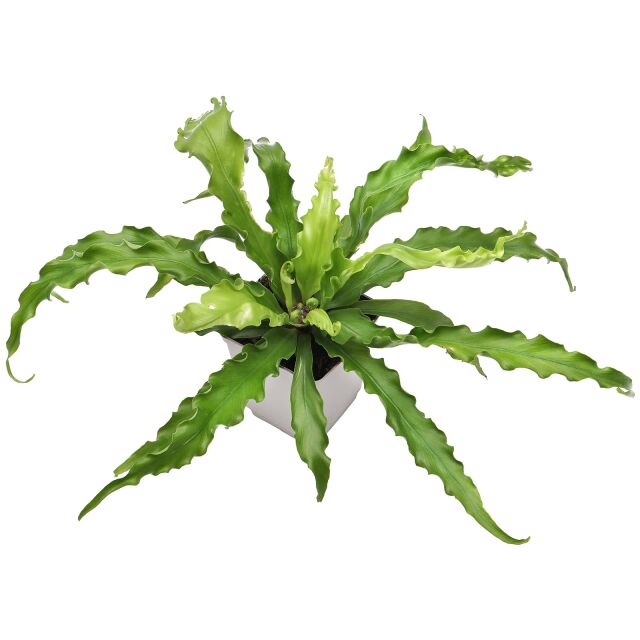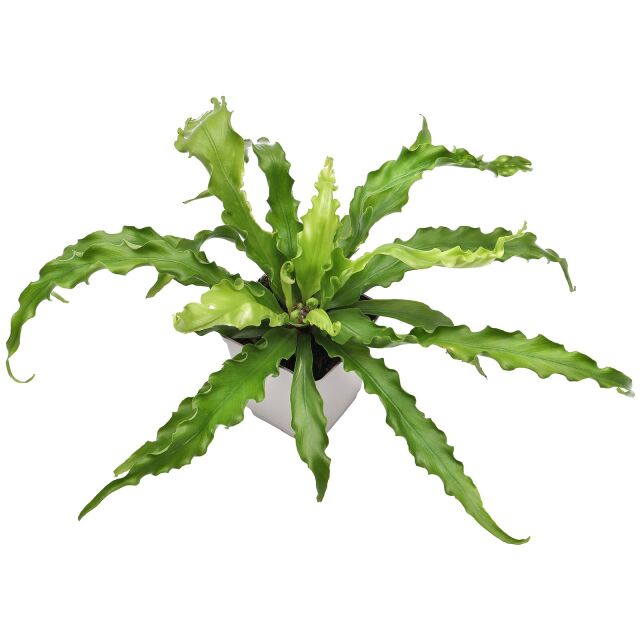Bird's-nest fern



Asplenium antiquum
Bird's-nest fern
- Dense, glossy green leaves
- Tropical appearance
- Linear sori on leaf undersides
- Epiphytic or humus-rich substrate
- Rosette-like formation
Sign in or Register
Item question
We’re here for you!
Please enter your question and e-mail and we’ll contact you as soon as possible. It usually takes us up to 24 hours during business days to respond.
Thank you for your question!
Thank you, we’ll get in touch!
Close window
You already sent us a question.
Please wait a few minutes
Description
Asplenium antiquum, known as bird's nest fern, originally comes from the tropical and subtropical regions of Asia. This epiphytic plant thrives in humid, shaded forests where it grows on trees or on the forest floor. Asplenium antiquum prefers high humidity and temperatures between 15 and 25 degrees Celsius. For terrarium cultivation, it is important to use a well-draining, humus-rich soil and to spray the plant regularly to maintain humidity. Direct sunlight should be avoided to prevent leaf burn.
The dense, glossy green leaves of Asplenium antiquum grow in a rosette-like formation, reminiscent of a nest. The simple, undivided fronds can reach up to one metre in length, providing an attractive, tropical appearance. In a terrarium, the plant serves not only as a decorative focal point but also as a natural shelter for small animals and reptiles. The linear sori on the underside of the leaves contribute to reproduction and are another interesting feature of this species. Asplenium antiquum helps to improve air quality in the terrarium by filtering pollutants and supporting high humidity, making it an ideal addition to humidity-loving terrarium environments.
Profile
| Asplenium antiquum | |
| Cultivation options | Epiphytic or in well-drained, humus-rich substrate |
| Growth height | Fronds up to 1 metre long, rosette-like formation |
| Temperature | 15 - 25 °C, not below 10 °C |
| Humidity | 60 - 90 %, tolerates high humidity very well |
| Light requirement | Bright, indirect light; no direct sunlight |
| Watering | Keep substrate moist but not waterlogged; regular misting recommended |
| Fertilisation | Moderate during the growing season, diluted liquid fertiliser every 4-6 weeks |
| Propagation | Division of the rootstock or spores |
| Suitable for | Small to large terrariums, as a focal point and for humidity-loving environments |
| Cultivation options |
| Epiphytic or in well-drained, humus-rich substrate |
| Growth height |
| Fronds up to 1 metre long, rosette-like formation |
| Temperature |
| 15 - 25 °C, not below 10 °C |
| Humidity |
| 60 - 90 %, tolerates high humidity very well |
| Light requirement |
| Bright, indirect light; no direct sunlight |
| Watering |
| Keep substrate moist but not waterlogged; regular misting recommended |
| Fertilisation |
| Moderate during the growing season, diluted liquid fertiliser every 4-6 weeks |
| Propagation |
| Division of the rootstock or spores |
| Suitable for |
| Small to large terrariums, as a focal point and for humidity-loving environments |
Terrarienpflanzen
Our terrarium plants give every terrarium an individual, natural atmosphere and at the same time provide a healthy environment for all terrarium inhabitants. Our wide range of tropical, subtropical and even arid plants are easy to combine and enhance any terrascape. Whether it's strong succulents, subtle tillandsias, eye-catching neoregelias or wonderful orchids - we offer terrarium plants for different terrascapes from rainforest to desert.
General information
Please choose a variant to see more information.
| Item no. |
|
| EAN | |
| Weight | |
| Shipping weight |
Customers ask customers
You have questions about this product? Ask other customer or our support team about this product!